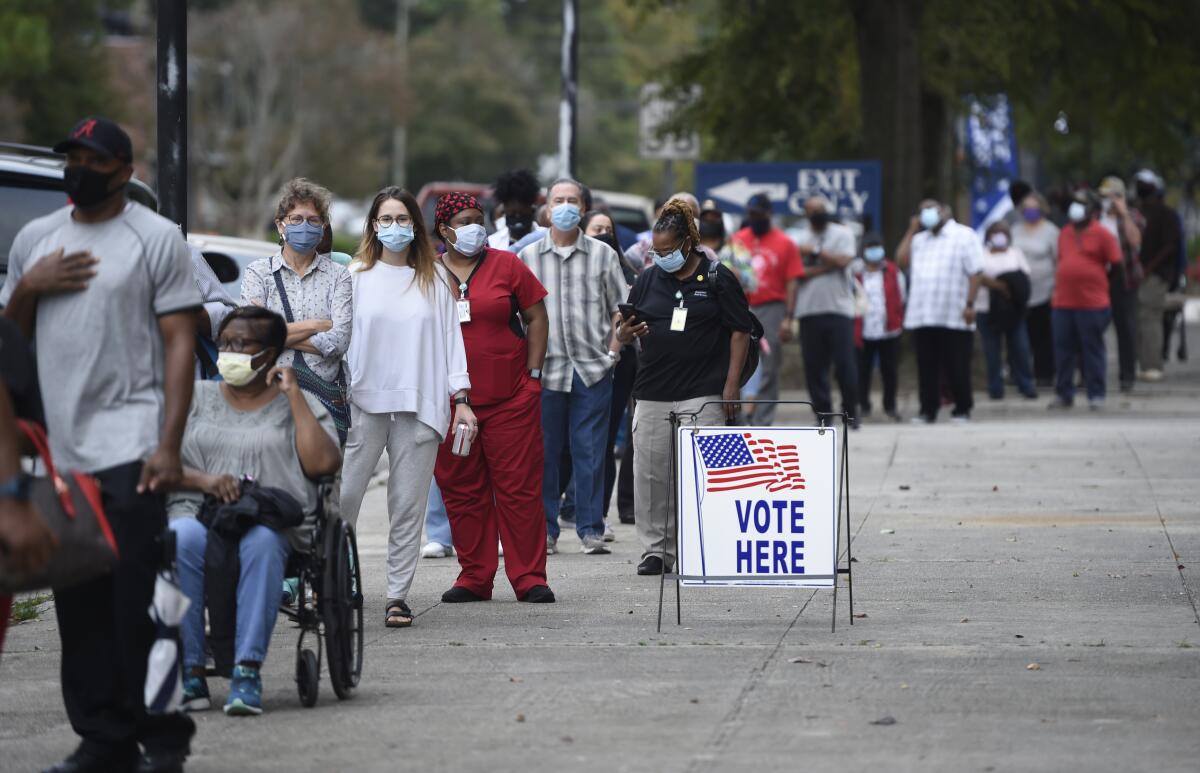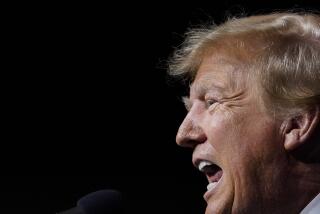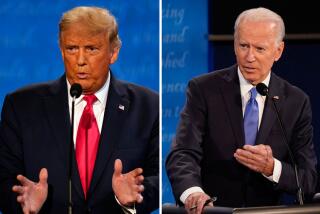Editorial: We can’t let Trump undermine this election

With the presidential election a little more than two weeks away, what was once whispered speculation about a disputed outcome has become a real possibility. President Trump, who has expressed fondness for authoritarians and contempt for constitutional norms, seems likely to question the legitimacy of the election if Democratic nominee Joe Biden prevails in a close race — or even, perhaps, if Biden wins in a landslide.
Meanwhile, federal and state courts are already dealing with a flood of lawsuits arising from attempts to make it possible for Americans to vote during a pandemic without jeopardizing their health. Could there be yet another election in which the winner of the popular loses the presidency, as has occurred five times in our history, most recently in 2000 and 2016?
Could Republican legislatures in states such as Pennsylvania set aside the will of voters (especially if their preferences aren’t clear) and send their own slate of electors to cast the deciding votes? Could the Supreme Court, as in 2000, be called upon to resolve vote-counting controversies in the states?
Could there be a catastrophic impasse, as in 1876? Could the election be thrown into the House of Representatives, as in 1800 and 1824? Could the entire legal process unfold, only for Trump to refuse to hand over power — or sabotage the peaceful transition of power?
For an “election meltdown” to be avoided, the institutions of our democracy — local election officials, state governments, federal and state courts, electors and current and former elected officials — may be called upon to do more than they ever would have imagined.
In a year in which former American Bar Assn. presidents and military law experts have warned about the possible conscription of government lawyers and the armed services in election-related misdeeds, nothing is to be taken for granted. Nothing about this presidency has been normal, and there is no reason to expect that it would end normally.
The warning signs are already here, and ominous. For example, Trump has suggested, falsely and repeatedly, that there would be something sinister about election results that weren’t conclusive on the evening of Nov. 3. (In July he tweeted: “Must know Election results on the night of the Election, not days, months, or even years later!”)
Because it looks as if far more Democrats are voting by mail than Republicans, Trump could be ahead in crucial states on election night, only to be overtaken by Biden when the tabulation of mail ballots is completed.
Given the enormous number of votes expected to be cast by mail, it’s a real possibility that we’ll have to wait longer than usual to figure out who won. Fortunately, California and several other states will be processing mail ballots either as they come in or before election day. (Alas, two states whose results could be crucial in a close election — Pennsylvania and Wisconsin — as of now will not start examining mail ballots until election day.) And more than 2 million Americans have already voted early in person, providing another bulwark against an overly protracted count.
But there are other scenarios, some more plausible than others, for a crisis.
What if some of Trump’s more frenzied supporters attempt to intimidate voters? (In the debate, Trump said: “I’m urging my supporters to go into the polls and watch very carefully.” Coming from a president who once urged police not to be “too nice” in handling criminal suspects, this was ominous.) Or if they take to the streets to protest the results of an election their idol has rejected as “rigged”?
The most frightening possibility is that Trump, even after a decisive loss in the electoral college, would attempt to cling to power past Jan. 20. That seems unlikely, despite Trump’s reticence to commit to a peaceful transfer of power if he lost. As Biden pithily put it in their Sept. 29 debate: Once the ballots are counted, “that’ll be the end of it.” Trump would be escorted out of the Oval Office by the Secret Service. (The military has no constitutional role to play here, as the chairman of the Joint Chiefs of Staff, Gen. Mark A. Milley, has wisely stated.)
But even if he left the White House, Trump could still sow division — perhaps leading to violence — if he took to Twitter to complain that he was the victim of a rigged election. That is where other figures in the Republican Party, including congressional leaders and even members of Trump’s Cabinet, would have to step up and publicly insist that the election is over and Biden is the next president. The living former presidents — Jimmy Carter, Bill Clinton, George W. Bush and Barack Obama — might need to speak up as well.
Another set of scenarios involves the electoral college, which under the Constitution’s archaic architecture actually chooses the president, and ambiguities in federal election law.
Although all 50 states award electors on the basis of the popular vote, there has been speculation that Republican legislatures in some states, citing supposed voter fraud, might contrive to appoint slates of electors supporting Trump even if Biden prevailed in the popular vote. This scenario seems unlikely and probably illegal. But even an attempt by Republican legislators to thwart the will of the voters is enough to chill us.
Under current law, states must resolve disputes about electors by the “safe harbor” date of Dec. 8 in order to have Congress accept the results as “conclusive.” If states miss that deadline, it’s more likely that members of Congress might challenge one or more slates of electors, as the Constitution permits them to do.
In 2000, the Supreme Court cited the nearness of the safe harbor date in its decision stopping a recount in Florida sought by Democratic nominee Al Gore, in effect making George W. Bush president. Trump has predicted that the Supreme Court will also resolve this election, adding that “it’s very important that we have nine justices.” (That put Judge Amy Coney Barrett, his nominee to the court, in an impossible position, leaving her no choice but to recuse herself from any election-related case should she be confirmed — though she refused to commit to recusal when pressed by senators during her confirmation hearings last week.)
It may be necessary for the high court to intervene, but that will be less likely if there is adequate time to fully count ballots and resolve disputes before slates of electors are sent to Congress.
To deal with that reality, Sen. Marco Rubio (R-Fla.) has proposed legislation to change two deadlines. The “safe harbor” date would be moved from Dec. 8 to Jan. 1, and the date on which electors would cast their vote would be changed from Dec. 14 to Jan. 2. Rubio’s bill wouldn’t affect either the date on which Congress tallied the electoral votes, which would remain Jan. 6, or the Jan. 20 date of the presidential inauguration, which is set by the Constitution.
Even with this insurance policy, there could be disputes in Congress about electoral votes or even the rejection of some states’ electors. It’s also possible that neither candidate will receive a majority of electoral votes. In that case, the selection of the president would move to the House of Representatives, where — as Trump has noted — each state delegation, regardless of size, would get one vote. (Californians, already enraged over having the same Senate representation as the people of Wyoming, should take note.)
In any election year, there is the possibility of a breakdown in the operation of the electoral college, which is another reason why the Constitution must be amended to provide for the election of the president by a national popular vote.
What’s different this year is that voting is being conducted during a national health emergency and the incumbent president is poised to discredit the election results if he loses, citing measures adopted to allow Americans to vote safely. Congress provided the states with only $400 million in aid for election systems in a COVID relief bill, well short of the $4 billion experts have said is needed this go-around, and further aid appears unlikely. Trump has also opposed adequate funding for the U.S. Postal Service because it might enable more voting by mail.
Trump has been explicit about his belief that increasing turnout would hurt Republicans; referring to a proposal by House Democrats to support mail-in voting across the country, Trump said on Fox News in March, “They had things, levels of voting that if you’d ever agreed to it, you’d never have a Republican elected in this country again.” That sentiment was sadly in keeping with a determination by the Republican Party in recent years that voter suppression is crucial to GOP victories.
Congress, the courts and, yes, Trump’s fellow Republicans must not let him get away with resisting or discrediting the outcome of this election.
It is possible, as polls suggest, that Biden may be heading for a decisive victory in both the popular vote and the electoral college, or that Trump will win a clear-cut victory. All Americans should recite the prayer of election officials: “Lord, let this election not be close.” But in the event of a close but conclusive outcome, Trump and his party must not be able to successfully sow doubt. The future of American democracy is at stake.
More to Read
A cure for the common opinion
Get thought-provoking perspectives with our weekly newsletter.
You may occasionally receive promotional content from the Los Angeles Times.






